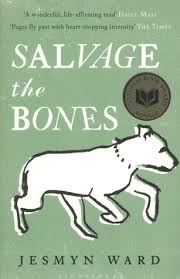This book was pretty popular at the height of my career as a bookseller, and so naturally, I've been avoiding it.  I don't (usually) do this on purpose, except when I do (I'm lookin' at you, Art of Racing in the Rain and Heartbreaking Work of Staggering Genius).
I don't (usually) do this on purpose, except when I do (I'm lookin' at you, Art of Racing in the Rain and Heartbreaking Work of Staggering Genius).
This past weekend I went on a drunk library request binge (so much more affordable than walking into the bookstore on the way home from the bar), and this was one of the books that showed up. I'm really glad it did.
Salvage the Bones takes place in rural Mississippi in the twelve days up to and including Hurricane Katrina. Esch is fourteen and pregnant, and it's easy to see how this could turn into a feel good beach read. The best thing about it, however, is that it doesn't come close. We see the world as it is, not idealized in any way. Esch's family is poor and unlucky, and nothing redeems them.
When I read, I'm not always able to visualize things, I just don't see what I'm reading as pictures in my head. Ward's "voluptuous" (see this great review from the New York Times) prose was at times helpful and at other times distracting. If you're a visual reader, I think you'll like this, but I got lost occassionally, having to go back to make sure I didn't miss a line of dialogue or other relevant plot details.
I've read a not a few other reviews that mention how difficult it was to get into this book or how it was too brutal to finish, and while my thoughts aren't fully formed on this, I think it's problematic. In an interview with the Paris Review, Ward speaks about her inspiration to tell the story of Katrina when the public had largely forgotten about it, and how she felt the book was not political enough. These books that are tough for us to read are exactly what we need to be reading. We give more attention to the ways in which the world is unequal and unfair, and spend more time understanding our role in the system that keeps it that way.
Ward, I think, is able to bring a part of the world that many of us have no experience or knowledge of to the fore in a way that makes it accessible, but not sugar-coated. Rather than giving up on the book, I hope that more people think critically about what Salvage the Bones is saying and what makes a story like this common in America. I see this book being read in Literature classes alongside classics, but hope we begin to engage with it long before it becomes one itself.
The Details:
Salvage the Bones by Jesmyn Ward
Bloomsbury, 2011
Rating: 3.5
Have you read Salvage the Bones? Let me know what you thought!




